Avoiding the Bermuda Triangle with Entrepreneur Avrum Elmakis
It was like a casual chat with a friend. CEO to CEO. Only he happens to run a $40 million company that in all likelihood will double its size in the next several years.
The Virginia Council of CEOs is all about quality knowledge sharing, and we weren’t disappointed as Avrum Elmakis took the stage during our recent Quarterly Luncheon.
Avrum Elmakis, CEO of TDBBS, LLC, is a self-proclaimed “business addict,” award-winning entrepreneur, strategic investor, innovator and trusted business consultant.
“Every person I meet wants to be an entrepreneur, “ said Elmakis to the large group. “We all know what it takes to do that. It takes a lot of passion and drive and risk – all those things that define who we are as entrepreneurs. That’s our first move into risk-taking. Then we become comfortable and we want to keep what we have. We become content.”
Elmakis’ advice is to join him in the world of the discontented.
Avoiding the Bermuda Triangle
Elmakis likens business contentment to the Bermuda Triangle – a place where business owners get comfortable generating a certain kind of volume and revenue. We get wrapped up in staying lean and small, and we don’t make the kinds of investments required to become a more formal organization. We hover instead of pivoting to the next revenue tier. We don’t allow our employees to take on responsibility. Our decision-making ability is paralyzed.
Sound familiar?
So how did Best Bully Sticks avoid the Triangle? “For me, an important moment was when I recognized early on the powerful concept of surrounding yourself with real quality people who are way more advanced than what you need. I started doing that in 2013, and it allowed us to fuel our growth early and break through. It’s very easy to fall into the trap of ‘I could hire this person, but the cost is too great for me.’”
A few other things we learned from Elmakis:
• A peer network is critical for an entrepreneur.
• The timing is never right. Don’t wait. Stretch yourself.
• Remember to check your company’s horizon often. Are you honoring your original intention?
• Always be able to separate emotional attachment to your business from good decision-making.
• The attraction to the excitement of a young company, the building of a team, the passion of an entrepreneur – these are things that should not be taken lightly when recruiting top talent.
What’s On Our Minds? Stinky Culture.
“If you have a bum culture, you can almost smell it.”
THINK ABOUT IT. This sentiment, expressed by Tom Laughon, co-founder of Catch Your Limit, sure rings true.
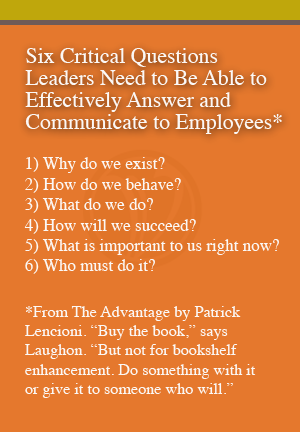 The good news, as we learned during his recent Knowledge Network presentation, is that it’s relatively easy to get rid of the stench. It begins with getting the right people on the bus and building a culture around trust.
The good news, as we learned during his recent Knowledge Network presentation, is that it’s relatively easy to get rid of the stench. It begins with getting the right people on the bus and building a culture around trust.
“The most strategic decisions a CEO should make are focused on people – checking who is on the bus and in the right seats, growing and retaining great talent and pruning all others. Where you’re going is for naught if you don’t have the right people to get you there.”
Sometimes it’s just plain nice to see a best practice in action, and that’s what Tom gave us. How do we connect with that passionate yet disparaged employee we saw on the video – the one who openly shared her concern for the business and wanted to do more to help it grow?
You have to be brave enough to hear what she has to say – all the good, the bad and the ugly about your business. You must simply listen and collectively think of ways to make a change. Then, “amazing conversations will result,“ Laughon promises us.
Remember: This is a “we” game. Listen. Get your employees involved. And witness a change.
* This “What’s On Our Minds” moment is from the VACEOs Knowledge Network Luncheon “The Company You Keep: Keys to Attracting, Growing & Retaining Talent,” presented by Tom Laughon, co-founder, Catch Your Limit Consulting.
3 Things Every CEO Needs
 A few weeks ago I had the pleasure of having lunch with Jonathan B. Smith, an entrepreneur, author and Certified EOS Implementer. We talked about the challenges faced by small business owners, and what to do when you hit the ceiling on growth.
A few weeks ago I had the pleasure of having lunch with Jonathan B. Smith, an entrepreneur, author and Certified EOS Implementer. We talked about the challenges faced by small business owners, and what to do when you hit the ceiling on growth.
You should read Jonathan’s great little book Optimize For Growth, but here’s the quick and dirty. He says that you need just three things to get unstuck and take your business to the next level.
1. A business operating system. EOS (Entrepreneurial Operating System) is a very good one. There are others. Without an operating system, everything revolves around the CEO, and/or in silos around the business. An operating system allows a business owner to build the strategy and infrastructure that is necessary to scale a business in a unified, repeatable, focused manner.
2. A peer advisory group. Jonathan was member of Entrepreneur’s Organization when he was a CEO. The VA Council of CEOs, which I lead, is similar to EO. Running a growing business is a lonely job. There are often issues that you cannot talk about with your employees, your banker or your spouse. A group of CEOs of similar sized businesses gives you a place to go with concerns about employees, growth plans and other things that keep you awake at night. Surrounded by peers you trust, you can learn faster, make better decisions and grow as a leader.
3. A business coach. All top performers have coaches, and you should too. You have got to have someone who holds you accountable for doing hard stuff, and for growing as a leader. The best coaches ask important questions at the right time, illuminate stuff that you would rather not address, and stretch your vision.
That’s it. Just three things. Now, get to work growing your business!
Scot McRoberts is Executive Director of the Virginia Council of CEOs. He also published this article on Linkedin.
B-School Resources for Your Growing Business
The University of Richmond’s Robins School of Business Executive Education division was established more than 50 years ago, but how well do you know this institution? You might think of it as a great place to take a business course – which it is – but as we found out, there’s much more to this program than you might imagine.
“Executive Education is part of a business school in a liberal arts, research institution. Further, many of our business school faculty have held corporate positions, which, when blended with their academic expertise, makes them uniquely qualified to assist organizations with their challenges and opportunities,” explains Robert R. Piazza, Director of Executive Education, Robins School of Business.
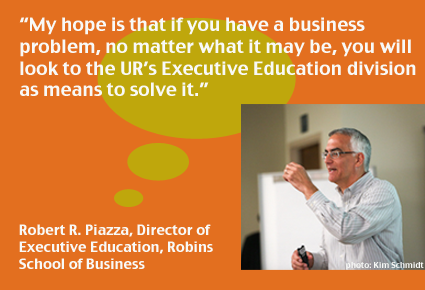
“For example, we work with a variety of organizations to first, understand their businesses, then provide custom solutions to their challenges. Sometimes that means we educate or train their employees, other times our engagements are considerably more complex involving consultation and facilitated processes. We have developed single courses as well as whole programs in leadership and business acumen. We have consulted on a variety of special projects, and have facilitated leadership retreats on strategy, talent management, and account management. We are often engaged for keynote speaking engagements on topics that are especially relevant for company and association meetings.
He adds, “We enjoy the variety of challenges we face with small, medium, and large-sized clients, and our clients enjoy the great value we provide for considerably less cost than commercial consulting companies.”
Customized Answers to Business Problems
A faculty deep into research and with extensive corporate work experience is an uncommon combination, Piazza tells us. So then, what’s the best way to TRULY take advantage of the university’s resources and expertise? Hire them!
If you have a specific business problem that requires input from a business consultant, and not just a class, look no further. The size of your business doesn’t matter. “My hope is that if you have a business problem, no matter what it may be, you will look to the UR’s Executive Education division as means to solve it,” says Piazza.
From specific challenges like “I’d like to break into a new market” to “I just want to make a profit,” or “I want my employees to work more effectively together” the Robins School of Business is there to help. And like any good consulting firm, the faculty is enthusiastic, engaging and results driven
Options for Everyone
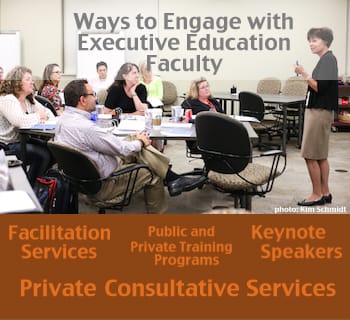
So what are you waiting for? There’s an option for everyone – no matter your challenge, training need, business size or personal level of expertise. All business professionals are welcome.
Executive Education public courses offer a variety of options in project management and training skills development. Those who’d like to update or broaden their overall business knowledge and skills should consider the Mini MBA program. Need a customized approach? Get started here today!
Guided by the Gestalt Protocol, Peer Groups Offer VACEOs Members a Safe Haven
Imagine seated to your right is someone who has made the Inc. 5000 list not once, but EIGHT times. Seated around the table to your left are several RVA 25 CEOs representing the technology, consumer products and staffing industries. Each is focused on your question, issue or opportunity. You finally realize: you are not alone. This is the feeling each VACEOs member has experienced during a Roundtable or Forum session.
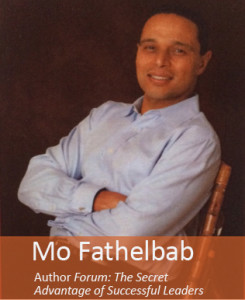 All new VACEOs members are assigned to a peer roundtable. It quickly becomes a safe haven – a place to vent, ask questions, release fears and build life-long friendships.
All new VACEOs members are assigned to a peer roundtable. It quickly becomes a safe haven – a place to vent, ask questions, release fears and build life-long friendships.
“Peer roundtables are important because they provide a unique opportunity to share and learn with a group of peers in a completely safe environment,” says Mo Fathelbab, Forum Resources Network president and author of Forum: The Secret Advantage of Successful Leaders.
“As a CEO, it’s often lonely at the top. You can’t share everything with your employees, partners, board members or investors. Members of a Roundtable have no personal interest in your decisions,” he adds.
Forum: The Secret Advantage of Successful Leaders explains Roundtable methodology and is required reading for all new VACEOs members.
“The Council’s Roundtables have been designed intentionally around the principles found in Fathelbab’s book,” says Scot McRoberts, executive director, VACEOs. “Each member is trained about our disciplined meeting process, which follows very specific language and meeting protocols. This is to ensure that every member gets the most out of the Roundtable or Forum meetings.”
“NO ADVICE” POLICY (GESTALT LANGUAGE PROTOCOL) IS KEY
All VACEOs Roundtables adhere to a set of ground rules by which the group must abide. Chief among them is strict adherence to a code of confidentiality and Gestalt Language Protocol.
“The Gestalt Protocol is based on the theory that as children we were always told what to do by our parents,” explains Fathelbab. “As a result, adults – especially entrepreneurs – resent being told what to do by anyone.”
The guiding principle of the protocol is to never give advice, but to share related experiences instead. Participants are careful to avoid phrases such as “If I were you…” when another group member presents his or her challenge. Learning to participate in a group this way takes effort and practice, but it’s essential for creating a safe, rewarding experience.
“Advice can be flat-out wrong,” says Fathelbab. “It can be judgmental. Advice creates an unsafe environment in a Roundtable, Peer Exchange Group or Forum. Each of us is best equipped to solve our own problem. The best anyone can do is to share their experience, allowing the person with the problem to glean from that experience what is best for him or her.”
“Sharing experiences allows members of a group to get closer by learning more about one another,” he continues. “By contrast, giving advice to a single member robs the group of all of the stories that can be so educational and socially bonding.”
ARE YOU IN NEED OF A SAFE HAVEN?
The Council is one of a handful of independent regional organizations of its kind in existence. Members enjoy the benefits of networking, camaraderie and the “safe haven” found in their roundtables and in their interactions with 180 other CEOs. Ready to learn more? View VACEOs membership info today.

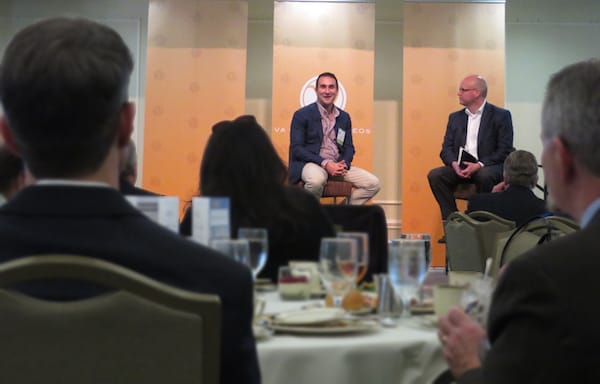
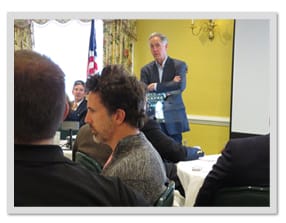
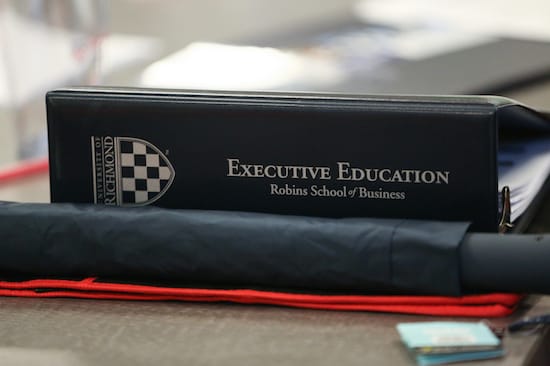

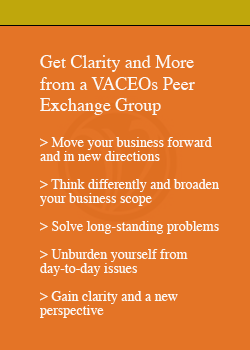
Recent Comments